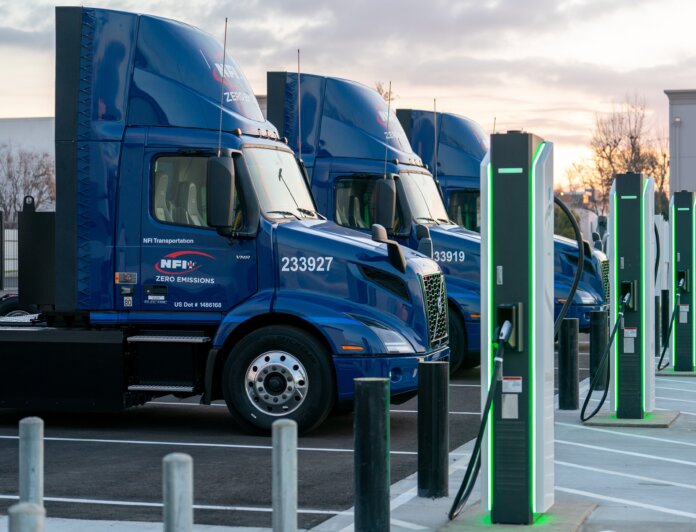NFI, a project partner of the Joint Electric Truck Scaling Initiative (JETSI), has officially received all 50 Class 8 battery electric trucks funded through the project — including 30 Freightliner eCascadia trucks and 20 Volvo VNR Electric trucks.
To support its scaled battery electric fleet, NFI has collaborated with Electrify America and Southern California Edison to energize its electric charging depot at its warehouse facility in Ontario, California, completing a crucial milestone in the electrification of NFI’s dedicated port drayage services. NFI’s newly inaugurated electric truck maintenance shop at the site is also operational.
NFI’s battery electric fleet is used to run routes from Ontario to the Ports of Los Angeles and Long Beach, performing drayage operations and delivering products to warehouses in Southern California — for customers spanning from manufacturing to retail. Its fleet of Freightliner eCascadia and Volvo VNR Electric trucks typically runs two port pickups per day, per truck, for an average of 220 miles driven between rechargings.
“NFI is committed to driving innovation and sustainability in the logistics and trucking industries,” says Brian Webb, president of port services, NFI. “Through NFI’s participation in the JETSI electrification project, battery electric Class 8 trucks have proven to be a reliable and efficient solution for our drayage operations to deliver goods to our customers, many of which appreciate the zero-emission freight strategy we offer.”
“Drayage trucks travel short distances between ports and regional warehouses, making them ideal candidates for zero-emissions technology, and this project in Ontario is an exemplary model for the future of freight transport,” says Liane Randolph, chair of the California Air Resources Board, one of the project’s state funders. “With 50 new zero-emissions trucks on the road and a new depot for charging infrastructure, the project is putting clean air solutions into action for a healthier California.”
The 50 additional battery electric trucks deployed through the JETSI project will offset approximately 4,400 metric tons of greenhouse gas emissions yearly, resulting in 2.45 tons of weighted criteria pollutant emission reductions and displacing over 2,750,000 gallons of diesel throughout the five-year project.
“At Volvo Trucks North America, we applaud NFI’s pioneering efforts in integrating electric trucks into their operations,” says Peter Voorhoeve, president of Volvo Trucks North America. “NFI’s participation in the JETSI project, utilizing Volvo VNR Electric trucks, showcases the viability and efficiency of electric Class 8 trucks in demanding applications such as port drayage. Together, we are driving positive change toward a more sustainable future.”
In addition to NFI’s financial contribution, funding for 50 of NFI’s battery electric trucks and its Ontario charging depot was provided through JETSI, which received $27 million in funding from CARB and the California Energy Commission. Additional funding was provided by South Coast AQMD, Mobile Source Air Pollution Reduction Review Committee, the Port of Long Beach and Southern California Edison. The JETSI project is part of California Climate Investments, a statewide initiative aimed at reducing greenhouse gas emissions, strengthening the economy, and improving public health and the environment.
To support its expanding battery electric truck fleet, NFI collaborated with Southern California Edison and Electrify America to develop its charging depot supporting refueling speeds up to 350 kW for capable trucks. When fully completed, the facility will feature roughly 7 MW of DC charging capacity shared across 38 individual DC fast chargers.
Later in 2024, NFI and Electrify America plan to enhance sustainability further by coupling approximately 1 MW of solar with nearly 8 MWh of on-site battery storage, enabling NFI to not only reduce its utility load during peak time-of-use energy prices, but also enable resiliency from grid outages via the deployment of microgrid functionality.





